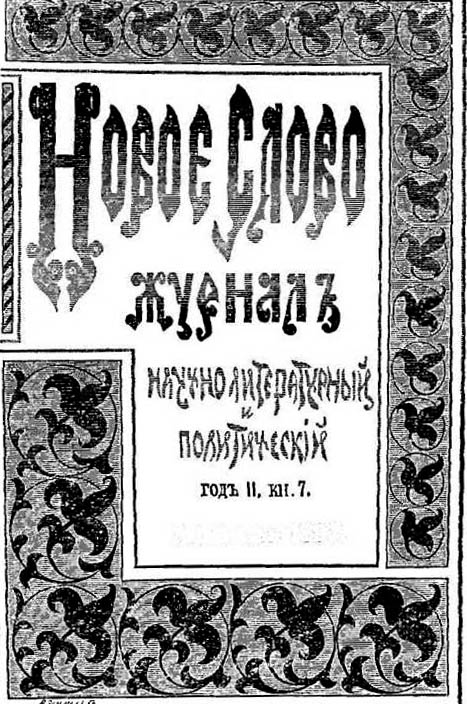Novoye Slovo on:
[Wikipedia]
[Google]
[Amazon]
 ''Novoye Slovo'' (; meaning: ''New Word'') was the title of two separate
''Novoye Slovo'' (; meaning: ''New Word'') was the title of two separate
 ''Novoye Slovo'' (; meaning: ''New Word'') was the title of two separate
''Novoye Slovo'' (; meaning: ''New Word'') was the title of two separate Russia
Russia, or the Russian Federation, is a country spanning Eastern Europe and North Asia. It is the list of countries and dependencies by area, largest country in the world, and extends across Time in Russia, eleven time zones, sharing Borders ...
n magazines published in Saint Petersburg
Saint Petersburg, formerly known as Petrograd and later Leningrad, is the List of cities and towns in Russia by population, second-largest city in Russia after Moscow. It is situated on the Neva, River Neva, at the head of the Gulf of Finland ...
, the first appearing between 1893 or 1895, and 1897 and the second in the fall of 1917.
The first incarnation of ''Novoe Slovo'' was originally run by moderate narodnik
The Narodniks were members of a movement of the Russian Empire intelligentsia in the 1860s and 1870s, some of whom became involved in revolutionary agitation against tsarism. Their ideology, known as Narodism, Narodnism or ,; , similar to the ...
s (populists). In April 1897 the magazine was taken over by Legal Marxist
Legal Marxism was a Russian Marxist movement based on a particular interpretation of Marxist theory whose proponents were active in socialist circles between 1894 and 1901. The movement's primary theoreticians were Pyotr Struve, Nikolai Berdyaev, S ...
s and edited by them until it was shut down by the Tsar
Tsar (; also spelled ''czar'', ''tzar'', or ''csar''; ; ; sr-Cyrl-Latn, цар, car) is a title historically used by Slavic monarchs. The term is derived from the Latin word '' caesar'', which was intended to mean ''emperor'' in the Euro ...
ist government in December 1897. It was followed by another Legal Marxist magazine, ''Nachalo
''Nachalo'' (''The Beginning'') was a Russian Marxist monthly magazine published in Saint Petersburg, Russia, in 1899.
Origins
When '' Novoye Slovo'', the flagship magazine of the Saint Petersburg-based Legal Marxists, was suppressed by the Czar ...
'', in January–June 1899.
''Novoe Slovo'' contributors included prominent Legal Marxists Peter Struve
Peter (or Pyotr or Petr) Berngardovich Struve (, ; – 22 February 1944) was a Russian political economist, philosopher, historian and editor. He started his career as a Marxist, later became a liberal and after the Bolshevik Revolution, joined ...
, Mikhail Tugan-Baranovsky
Mikhail Tugan-Baranovsky (; ; January 20, 1865 - January 21, 1919) was a Russian and Ukrainian Marxism, Marxist, economist, and politician.
He was a leading exponent of Legal Marxism in the Russian Empire and was the author of numerous works dea ...
, Sergei Bulgakov
Sergei Nikolayevich Bulgakov (, ; – 13 July 1944) was a Russian Orthodox theologian, priest, philosopher, and economist. Orthodox writer and scholar David Bentley Hart has said that Bulgakov was "the greatest systematic theologian of the tw ...
as well as revolutionary Marxist
Marxism is a political philosophy and method of socioeconomic analysis. It uses a dialectical and materialist interpretation of historical development, better known as historical materialism, to analyse class relations, social conflic ...
s Georgy Plekhanov
Georgi Valentinovich Plekhanov ( rus, Георгий Валентинович Плеханов, p=ɡʲɪˈorɡʲɪj vəlʲɪnʲˈtʲinəvʲɪtɕ plʲɪˈxanəf, a=Ru-Georgi Plekhanov-JermyRei.ogg; – 30 May 1918) was a Russian revolutionary, ...
, Vladimir Lenin
Vladimir Ilyich Ulyanov ( 187021 January 1924), better known as Vladimir Lenin, was a Russian revolutionary, politician and political theorist. He was the first head of government of Soviet Russia from 1917 until Death and state funeral of ...
, Julius Martov
Yuliy Osipovich Tsederbaum (24 November 1873 – 4 April 1923), better known as Julius Martov, was a Russian revolutionary, politician, and a leader of the Mensheviks, a faction of the Russian Social Democratic Labour Party (RSDLP). A close ...
and Vera Zasulich
Vera Ivanovna Zasulich (; – 8 May 1919) was a Russian socialist activist, Menshevik writer and revolutionary. She is widely known for her correspondence with Karl Marx, in which she put into question the necessity of a capitalist industriali ...
. Maxim Gorky
Alexei Maximovich Peshkov (; – 18 June 1936), popularly known as Maxim Gorky (; ), was a Russian and Soviet writer and proponent of socialism. He was nominated five times for the Nobel Prize in Literature. Before his success as an aut ...
, an increasingly popular realist writer who was close to Russian Marxists, was also published in the magazine.
The title was used again in 1917 when the Russian Provisional Government
The Russian Provisional Government was a provisional government of the Russian Empire and Russian Republic, announced two days before and established immediately after the abdication of Nicholas II on 2 March, O.S. New_Style.html" ;"title="5 ...
suppressed '' Zhivoye Slovo'' (''The Live Word'') in August and the magazine reappeared first as ''Slovo'' (''The Word'') and then as ''Novoye Slovo''.
From 1933 to 1944 a newspaper of White émigré
White Russian émigrés were Russians who emigrated from the territory of the former Russian Empire in the wake of the Russian Revolution (1917) and Russian Civil War (1917–1923), and who were in opposition to the revolutionary Bolshevik com ...
s named ''Novoye Slovo'' appeared in Berlin
Berlin ( ; ) is the Capital of Germany, capital and largest city of Germany, by both area and List of cities in Germany by population, population. With 3.7 million inhabitants, it has the List of cities in the European Union by population withi ...
.
References
*Vladimir Lenin. ''The Letters of Lenin'', Kessinger Publishing, 2005, p. 31, footnote 1. *Vladimir Lenin. ''Toward the Seizure of Power. Part One'', Kessinger Publishing, 2005, , pp. 280–281 Defunct magazines published in Russia Defunct political magazines Magazines established in 1894 Magazines disestablished in 1944 Magazines published in Berlin Novoe Slovo Magazines published in Saint Petersburg Russian-language magazines Political magazines published in Russia {{Europe-poli-mag-stub